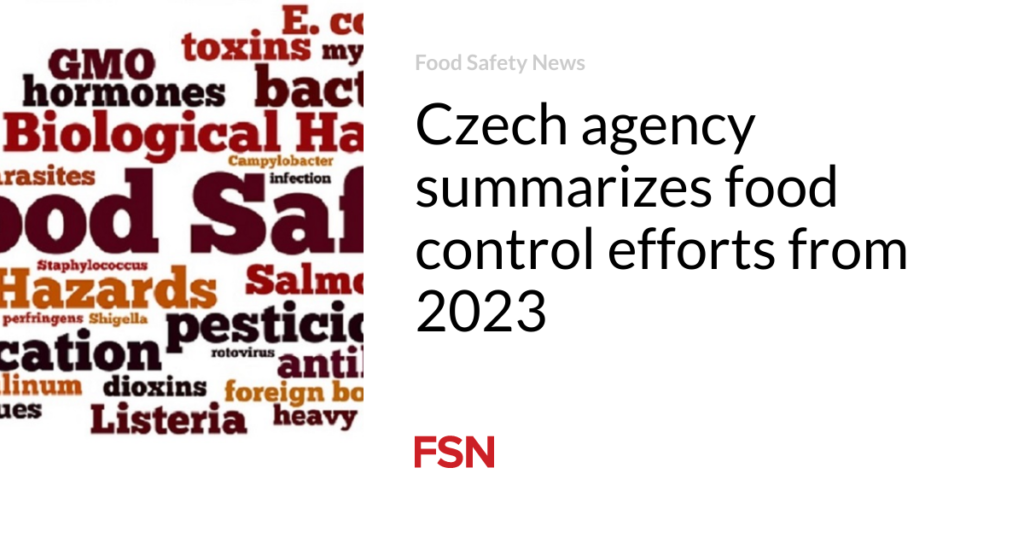In its annual report, the Czech Food Agency revealed the results of various inspections and controls.
In 2023, the Czech Agricultural and Food Inspection Service (SZPI) detected 4,192 non-compliant lots of food and other products, including 3,542 in retail, 160 in production, 128 in wholesale and 362 in other sectors.
The SZPI found the most non-compliance in food imported from outside the EU, while items produced by domestic producers had the lowest proportion of non-compliant samples.
3,435 samples of food, meals, ice, bottled water and environmental swabs were checked for compliance with microbiological standards. On-site inspections found 370 lots unfit for human consumption and laboratory tests detected 151 non-compliant samples.
Dairy products, meat products and raw vegetables had the highest number of samples found to be unsafe. Common problems included visible mold growth and spoilage.
Microbial incompatibility
Fourteen lots of fresh chicken, goose and duck meat and one lot of pork tested at the market were found to have Salmonella bacteria. One lot of smoked trout fillets from the market and one lot of cold dishes from the manufacturing plant were found to have Listeria bacteria.
Three lots of mushrooms native to Asia exceeded the limit for Bacillus cereus, and one steak tartare sample taken from a catering establishment tested positive for enteropathogenic E. coli (EPEC).
SZPI carried out 13,550 inspections in restaurants, bistros, pubs, bars and other public eating and drinking establishments. The agency found violations of the law in almost every fourth inspection in this sector.
Nearly a third of the establishments inspected did not meet standards in an inspection that focused on compliance with hygiene rules. The current situation in the public catering sector is “not satisfactory,” SZPI said, adding that it would pay closer attention to the industry.
Thematic testing revealed problems with the properties of apples, olive oil and honey, food labelling and traceability of food from Ukraine. Eight out of 66 chicken samples from Ukraine tested positive for Salmonella Infantis.
371 notifications concerning the Czech Republic were distributed through RASFF’s national contact point, and the country sent 93 unique notifications.
Approximately 3,000 administrative procedures were completed for non-compliance by businesses with food-related legislation, for which SZPI imposed fines of approximately CZK 130 million (US$ 5.7 million), an increase of approximately CZK 18.5 million (US$ 800,000) compared to the previous year.
Inspection results
Meanwhile, a recent inspection by the State Veterinary Service (SVS) uncovered violations regarding meat storage and product traceability.
During a visit to a restaurant in the Znojmo district in April, SVS inspectors found several violations of rules on the storage of animal products, including the storage of meat of unknown origin and expired meat, and the operator had also stored some raw materials at incorrect temperatures.
Authorities found 11 kilograms of meat of unknown origin and 13 kilograms of expired packaged meat in the freezer. Temperature tests on some of the meat showed it was above 12 degrees Celsius (53.6 degrees Celsius), while the legal limit is 4 degrees Celsius (39.2 degrees Celsius). Administrative proceedings have been opened against the restaurateur, who could face fines of up to 50 million CZK (US$2.2 million).
In March, a van carrying 1,315 kilograms of substandard animal-based food was inspected during a joint inspection with customs officials.
The vehicle, registered in Poland, was carrying raw and frozen chicken meat that was not in the manufacturer’s original packaging. It was not possible to match the documentation with the food being transported. Inspectors could not check the expiration dates of the food or whether it came from a licensed operator under their supervision. Veterinary officials seized the products and ordered them destroyed.
Also in March, SVS officials and police discovered an illegal food warehouse in Prague, where around 300 kilograms of food of animal origin – frozen seafood, meat products and frozen pork – were stored in an unlicensed location.
The products were unlabelled, had no manufacturer’s packaging and vendors had not provided documentation of their origin. Some of the goods showed signs of improper storage or freezing. The storage and sale of animal products is prohibited and vendors will be fined.
(Click here to sign up for a free subscription to Food Safety News.)


